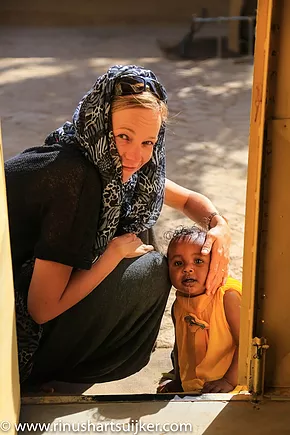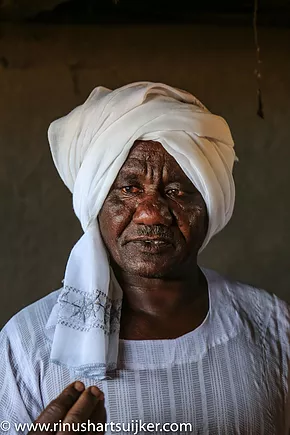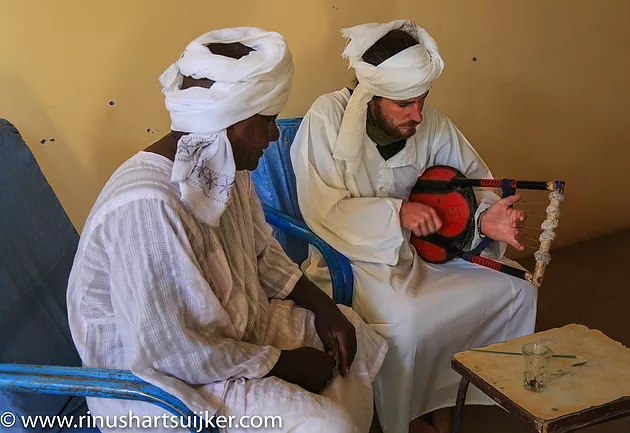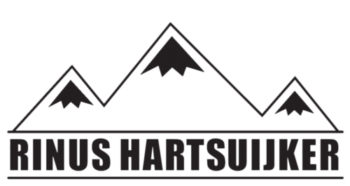The warm heart of Sudan
Do you also hate to peel a pineapple? The skin is too hard, can be very sharp and it is a hell of a job to get through it in the first place. When you finally succeed to get the fruit out of its shell, you will have this delicious piece of pineapple.
The comparison is maybe a bit strange, but to us traveling through Sudan is a bit the same. It seems like a hard shell: an inaccessible, very religious country at first glance and it is almost impossible to have no prejudices before entering. But when you do get to the core, it is an amazing experience. The warmth, friendliness and hospitality of the Sudani people knows no boundaries. You can read all about it in this blog.
But before you start to read, lets start with some background information. In 2015 Sudan was put on the OFAC list of the United States, because the US sees Sudan as a dangerous terrorist stronghold. This list blocks and stops all trade, development and support to a country. For us as independent travellers this meant that it was impossible for people in Sudan to visit our website and for us to update and upload it without using a VPN (Virtual Private Network).
During the last few weeks all eyes were on Trump and his new policy that prevents people from certain islamic countries to travel to the US, and one of them is Sudan.

Earlier on we have already blogged about our Sudan adventures to give our readers an impression of what it is like to travel here. For the people in Sudan it is important that travellers tell about the real Sudan. So in this last write-up on Sudan we will tell you some more tales on what makes it so special to travel through this country.
Sudan is dry, it is NOT not beautiful, it is NOT not interesting, but it is very, very dry. On our journey we follow the Nile. The Nile is one of the, maybe even the longest river in the world which starts as the White Nile in Lake Victoria, Uganda and as the Blue Nile in Lake Tana, Ethiopia. In Khartoum, Sudan, these two rivers meet and become the Nile. The river zigzags through this African country like a life line. It brings life to the land.
The rain season in Rwanda and Uganda fills up the Nile and carries it all the way up to irrigate the countries in the north. Not until Sudan and later on Egypt do we begin to understand the value of this river. When you leave the Nile you will find yourself in between sand dunes, endless emptiness, clear starry skies, small nomadic villages and encampments of gold diggers. When you find you way back to the Nile there is life, green fields, markets, dates and hustle and bustle. Water is the lifeline through this country.
During our travels in Sudan we often get the question: Do you think we are terrorists?
A smile on the face of the person who asks this question makes it a bit more casual than it seems. “ No, I don’t think so” is our answer. “ A lot is happening in the world today and it doesn’t make the whole population terrorists. It would be unfair to tar everyone with the same brush. We love Sudan!” The person who asked the question looks relieved and satisfied. “What is the best thing about Sudan?” is his next question. “ the hospitality and friendliness of the people!” is our immediate response.
In our first days in Sudan we are a bit careful and maybe also a little bit suspicious, but we find out pretty soon that Sudan is sincere. When we stop for a short break someone will offer us tea, when we sit down in a cafe, order something and ask for the bill we find out that the gentleman in the corner has already paid for us. When we take a stroll on the market to buy some tomatoes we are not allowed to pay, because “you are our guests.” Finding our way through the city on foot and asking for directions we are directly seated in someones car to take us to the right address. These are just a few examples of what we experienced in Sudan.

Dongola:
Thirsty, dusty and sweaty we arrive in Dongola. A man whose experience in life is written on his
face in deep lines, wearing a traditional white dress, welcomes us. “ Welcome my friends, welcome to Sudan”. He introduces himself as Kamal. Kamal is a farmer in Dongola and proud of what he does. Before he started farming he was a translator and that is why his English is good, but a little rusty. He invites us to the home of his brother in law where we get tea and typical Sudanese food. Kamal has a mission.
“I want to show you the real Sudan. Not the Sudan you know from the television, not what the media tries to tell you. I want to show you how we live, what we eat, what we do from day to day. Not polished or better than it is, I will show you “Sudan without make-up”
For the next two days Kamal and his brother in law take us to their families, we learn about traditional Sudanese houses, their different ways of life, we walk over the market where Kamal teaches us what to look for, we stroll down their farmlands and learn about dates, irrigation, pumps, water channels and the cooperation of the different people. We also have long conversations about believes and the cultural differences between our countries. We tell Kamal about the Netherlands and the way we deal with religion, marriage, alcohol, drugs and upbringing. He blinks his eyes once or twice when we tell him that it is possible for people of the same gender to get married and get or adopt children. Without immediately giving his opinion he listen to our stories in disbelief. Still, he somehow seems to understand and respect it, even though his preference clearly goes out to his own values which he got from his upbringing in Sudan.

We are very surprised when we get back to the house we are staying at on the second night to find that our host invited around 30 guests to celebrate us being there. Everyone gathers around on the ground, in front of the house on rugs especially laid down for all the guests. Large plates are brought from the kitchen to the front of the house to feed everyone. When we are introduced to some of the guests, all men, it turns out that they all come from the army base nearby and all have different ranks and positions within the military. We quickly get into a conversation with someone who speaks very well English and is a doctor, a gynecologist to be precise.
He invites us the next day for a tour around the hospital. We gladly accept the invitation since it is a good opportunity for us to hand out our last AfriPads to women who need it. Even though there are many women waiting for their appointment with the doctor, he drops what he is doing the moment we come in and listens to our information about the AfriPads. He promises to hand out the pads to women who he thinks can really use it. He also tells us about the government campaigns against female genital mutilation, a very important and good cause, because it is still something that is practiced throughout Sudan in the rural areas.
Just before we leave he invites us watch him perform a caesarean he is about to do. We look at each other, but decide to turn down this offer. Really, Sudanese hospitality is endless!
Parting with Kamal is hard for all of us. We would have loved to bring him along all through Sudan, but he says he has a family to take care of. We can see emotion in his eyes when we leave and he says: “ today is a sad day, because you are leaving. “
As rich as we are with this experience, as difficult it feels to part. We leave Dongola and turn right, following the train tracks into the desert.
